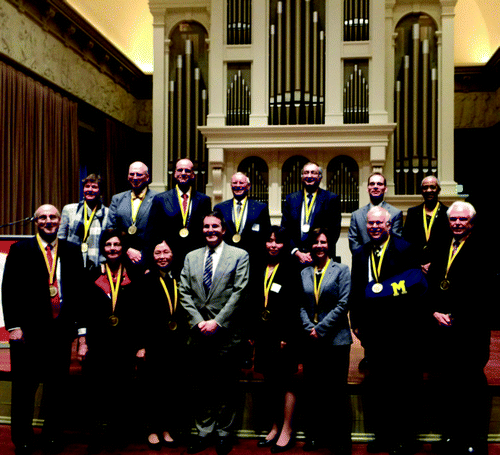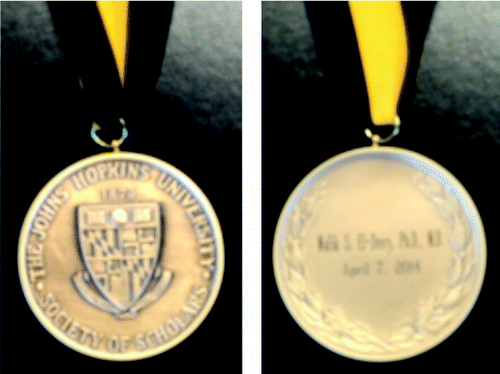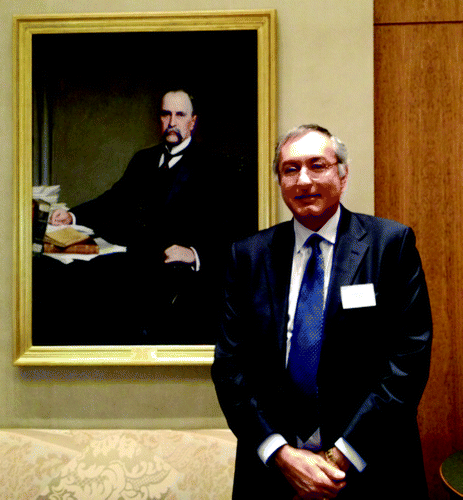Cancer Biology & Therapy Editor-in-Chief Wafik S El-Deiry, MD, PhD, FACP, was inducted in the 2014 Society of Scholars of the Johns Hopkins University on Monday, April 7, 2014 during events in Baltimore, Maryland. Dr El-Deiry is one of 16 inductees selected for this honor in 2014 ().
Figure 1. Photo of new members of the Johns Hopkins University Society of Scholars taken on April 7, 2014 at the Induction Ceremony, Peabody Institute of The Johns Hopkins University. Dr El-Deiry is third from the right in second row.

Inductees were honored at the Johns Hopkins University School of Medicine as well as with a reception and induction ceremony at the Peabody Institute of The Johns Hopkins University. The evening culminated with a reception and dinner at the George Peabody Library. The Society of Scholars was created on the recommendation of then-University President Milton S Eisenhower and approved by the university board of trustees on May 1, 1967. The society—the first of its kind in the nation—inducts former postdoctoral fellows, postdoctoral degree recipients, house staff, and junior or visiting faculty who have served at least a year at Johns Hopkins, and thereafter gained marked distinction elsewhere in their fields and for whom at least five years have elapsed since ending their service at Johns Hopkins. The Committee of the Johns Hopkins Society of Scholars, whose members are equally distributed among the academic divisions, elects a limited number of candidates each year from nominations by the academic divisions having postdoctoral programs. The scholars are presented with a certificate and a medallion () on a black and gold ribbon at an annual induction ceremony. There are currently 611 members in the Johns Hopkins Society of Scholars.
Figure 2. Medallion given to Dr El-Deiry during the Johns Hopkins University Society of Scholars award ceremony in Baltimore, Maryland on April 7, 2014.

Dr El-Deiry () is the Rose Dunlap Professor of Medicine and Chief of the Hematology/Oncology Division at Penn State University’s Milton S. Hershey Medical Center and the Penn State College of Medicine, Associate Director for Translational Research and Program Leader of Experimental Therapeutics at the Penn State Hershey Cancer Institute. Dr El-Deiry is one of 40 active American Cancer Society Research Professors. In 2013–2014 he served as the Interim Director at the Penn State Cancer Center. Dr El-Deiry earned his MD and PhD degrees from the University of Miami School of Medicine and completed internal medicine residency at the Johns Hopkins Hospital and then completed oncology fellowship training at the Johns Hopkins Oncology Center in Baltimore. While at Johns Hopkins, he discovered p21(WAF1) as a p53 target gene, universal cell cycle inhibitor and tumor suppressor gene that for the first time explained the mammalian cell stress response. This is the most highly cited original work published in the journal Cell over the past 20 years. This work elucidated for the first time how mammalian cells arrest the cell cycle in response to DNA damaging signals such as chemotherapy or radiation.
Figure 3. Photo of Dr El-Deiry in front of portrait of Sir William Osler at the Johns Hopkins University School of Medicine on April 7, 2014. Sir William Osler served as Physician-in-Chief at the Johns Hopkins Hospital from 1889 to 1905 and as Dean of the Medical Faculty at The Johns Hopkins School of Medicine from 1898 to 1899. He founded the Interurban Clinical Club in 1905 before leaving Johns Hopkins for Oxford where he served as Regius Professor Of Medicine at Oxford University from 1905 to 1919. Dr El-Deiry served as President of the Interurban Clinical Club (2013–2014), Secretary/Treasurer (2008–2013), and Councilor for Philadelphia (2007–2009).

Dr El-Deiry joined the faculty at the University of Pennsylvania School of Medicine as Assistant Professor of Medicine and Genetics in 1994, Associate Professor with tenure in 1999 and rose to full Professor of Medicine, Pharmacology and Genetics with tenure by 2005. He was an Investigator with the Howard Hughes Medical Institute from 1995 to 2004. He served as co-Program Leader of the Radiobiology and Imaging Program at the Abramson Comprehensive Cancer Center and as Associate Director for Physician-Scientist Training in Hematology/Oncology at the University of Pennsylvania. He made several discoveries in the field of cell death and tumor suppressor genes including discovery of TRAIL death receptor DR5 as a target of the p53 tumor suppressor. For over 10 years Dr El-Deiry’s laboratory has been performing functional small molecule discovery screening and in vivo validation/efficacy testing process for accelerating the identification and development of molecularly-targeted anti-cancer therapeutics targeting mutant p53, hypoxic sensitization and the TRAIL cell death pathway. Dr El-Deiry founded Oncoceutics, Inc. in 2004, which has licensed first-in-class TRAIL pathway-inducing small molecule TIC10 for clinical development as ONC201 (first-in-human trials to begin in 2014). He founded p53-Therapeutics, Inc. in 2013 for further development of mutant p53-targeted therapeutics.
Dr El-Deiry has over 300 peer-reviewed publications. He has been active in serving on journal editorial boards including as Associate Editor for the Journal of Clinical Investigation from 2007 to 2010 and as the Founding Editor-in-Chief of Cancer Biology & Therapy from 2001 to the present. Dr El-Deiry is active in the NIH review system, lectures widely throughout the world and was named as a highly cited researcher by Thompson ISI in the field of molecular biology and genetics in 2005 and as one of America’s Top Oncologists by the Consumer Research Council of America in 2008 and 2009. He is a member of the Faculty of 1000 in Cell Growth and Division.
Dr El-Deiry is a member of several national physician honor societies including the Interurban Clinical Club started by Sir William Osler in 1905 (President 2013–2014), the American Society of Clinical Investigation and the American Association of Physicians. He is a Fellow of the American College of Physicians. He has organized several international meetings including the International p53 Workshop and the International Conference on Tumor Progression and Therapeutic Resistance. He has won several awards including the Michael S. Brown Junior Faculty Research Achievement Award from the University of Pennsylvania in 1998, the Elizabeth and John Cox Award for Molecular Advances in GI Diseases and Cancer from Georgetown University in 2005, the 2009 international Kuwait Prize in Applied Sciences for “Cancer Diseases”, the 2010 Distinguished Speaker Award from the Thomas Jefferson University School of Graduate Studies, the Dean’s Award for Excellence in Teaching at the Penn State College of Medicine in 2012 and the Department of Medicine’s Excellence in Mentoring Award in 2013. He is a practicing physician–scientist who specializes in colorectal cancer treatment and leads several clinical trials for this patient population.
